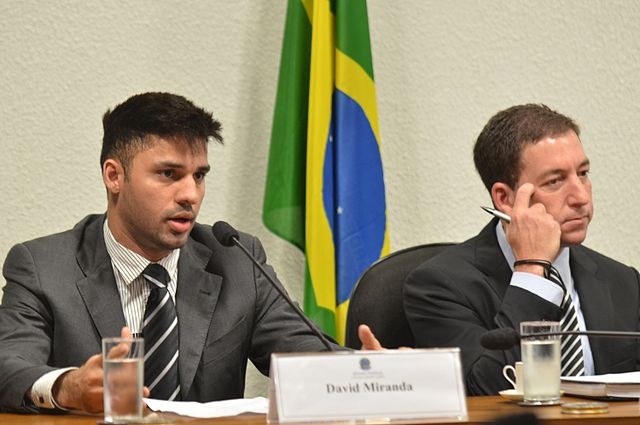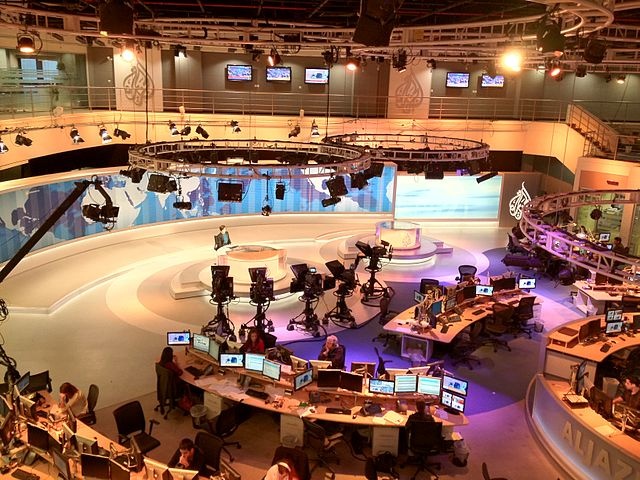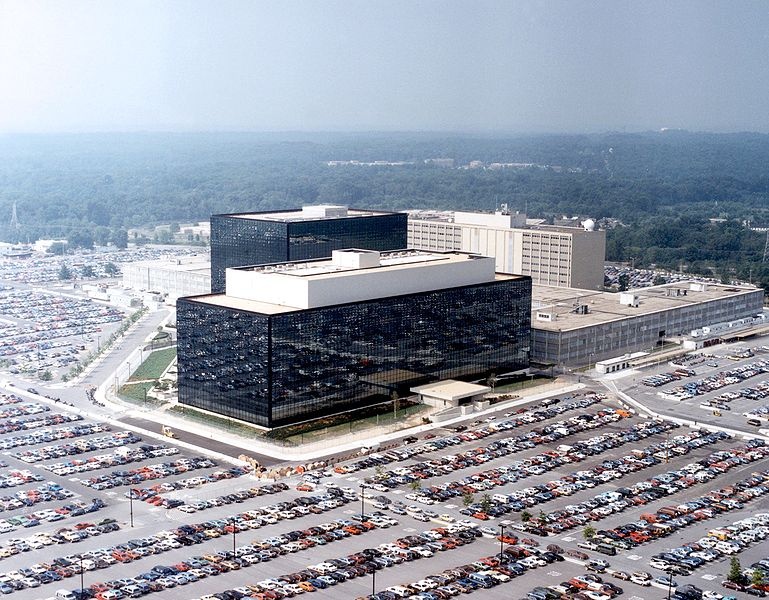Today, the 11th of February, is a "day of action" against government surveillance. The basic idea – set out by the people behind The Day We Fight Back – is for around 6,000 websites to display banners saying they're not down with being spied on by their governments. How exactly this will stop the single largest surveillance operation in the history of the world remains to be seen. But we thought we'd get in the spirit anyway with a couple of articles relating to the NSA. Here's one about the future of journalism in the post-Snowden landscape. David Miranda (left) and his partner, the Guardian journalist responsible for publishing many of Edward Snowden's NSA leaks, Glenn Greenwald. (photo via)It takes a very unique type of exhibitionist to be comfortable in the knowledge that strangers are analysing everything you say and storing it away for posterity. But even if you're totally OK with the NSA and the surveillance systems of its "Five Eyes" – an anglophonic alliance comprising the US, Canada, New Zealand, Australia and the UK – it might be helpful to know that mass government surveillance poses a threat to more than just your own, individual privacy. It affects the work of journalists, too. Which means, in a nutshell, that the NSA and its partners aren't just monitoring the things that we say – they may also be stopping us from talking about things the government doesn't want the public to be talking about.Through their muting of journalism, mass surveillance operations like the NSA and GCHQ ultimately result in you – and anyone you know with an interest in what their governments are up to – becoming less informed. Countries like Saudi Arabia, Bahrain and China have methods in place to prevent their citizens from accessing information online that they don't want them to see. The surveillance organisation's tactic, however, is to prevent that information from going anywhere near the public in the first place.Unless you're a paranoid patriot, you will have accepted that the NSA is not acting solely in the interests of "national security", in terms of monitoring the threat of a military, terrorist or cyber attack. For example, it's hard to work out how many lives were saved by the economic espionage aimed at Brazilian oil company Petrobas, or how gaining bargaining leverage by surveilling the UN, the G20 summits and a slew of world leaders directly prevented any bombs going off.
David Miranda (left) and his partner, the Guardian journalist responsible for publishing many of Edward Snowden's NSA leaks, Glenn Greenwald. (photo via)It takes a very unique type of exhibitionist to be comfortable in the knowledge that strangers are analysing everything you say and storing it away for posterity. But even if you're totally OK with the NSA and the surveillance systems of its "Five Eyes" – an anglophonic alliance comprising the US, Canada, New Zealand, Australia and the UK – it might be helpful to know that mass government surveillance poses a threat to more than just your own, individual privacy. It affects the work of journalists, too. Which means, in a nutshell, that the NSA and its partners aren't just monitoring the things that we say – they may also be stopping us from talking about things the government doesn't want the public to be talking about.Through their muting of journalism, mass surveillance operations like the NSA and GCHQ ultimately result in you – and anyone you know with an interest in what their governments are up to – becoming less informed. Countries like Saudi Arabia, Bahrain and China have methods in place to prevent their citizens from accessing information online that they don't want them to see. The surveillance organisation's tactic, however, is to prevent that information from going anywhere near the public in the first place.Unless you're a paranoid patriot, you will have accepted that the NSA is not acting solely in the interests of "national security", in terms of monitoring the threat of a military, terrorist or cyber attack. For example, it's hard to work out how many lives were saved by the economic espionage aimed at Brazilian oil company Petrobas, or how gaining bargaining leverage by surveilling the UN, the G20 summits and a slew of world leaders directly prevented any bombs going off. The Al Jazeera news desk (photo via)The same can be said for the targeting of various media outlets. One Snowden document showed that Al Jazeera's internal communications were broken into by the NSA, compromising some of their highly sensitive sources. Russell Tice, an NSA employee who acted as a source on the New York Times story about George W Bush's warrantless wiretapping, has said that the agency also specifically targeted US journalists.In reaction to the Snowden leaks, Western authorities – particularly the British government – have aggressively and physically targeted those publishing the documents. In July of last year, after the Guardian were threatened with legal action for publishing information relayed in Snowden's leaks, a senior editor and a computer expert smashed up all the hard drives and memory chips that had previously been used to store encrypted data – all under the watchful eye of technicians from GCHQ, who took notes and photos but left empty-handed.A month later, David Miranda – the partner of Glenn Greenwald, the American journalist who broke most of the Snowden leaks in the Guardian – was detained at Heathrow Airport for nine hours under schedule 7 of the UK's terror laws. Under those circumstances, authorities have enormous discretion to search and question people, and suspects have no right to legal representation. The fact that Miranda isn't even a journalist is a good demonstration of the government treating anyone who exposes their embarrassing secrets as a legitimate threat.If that just sounds like hyperbole from a journalist writing about journalists, it's worth looking at some comments made by top-ranking officials in both the UK and the US. At the end of last year, an assistant commissioner at Scotland Yard lumped journalists into the same bracket as terrorists, and at the beginning of this year Director of US National Intelligence James Clapper openly equated them with criminals.Of course, governments targeting journalists isn't anything new – there are plenty of documented cases from before the Snowden leaks. A month prior to their emergence, the AP had the records of 20 of their phone lines seized by the US Justice Department, and James Rosen – a Fox News reporter – had his email account accessed by the FBI.But a much more pervasive danger to journalism now exists through these omniscient spy programmes. And it's one that doesn't attack one journalist specifically, or even one media outlet. It is the untargeted collection of metadata – which is often mislabelled as innocuous because it's not the direct content of messages – that poses the greater threat to journalism as a whole.
The Al Jazeera news desk (photo via)The same can be said for the targeting of various media outlets. One Snowden document showed that Al Jazeera's internal communications were broken into by the NSA, compromising some of their highly sensitive sources. Russell Tice, an NSA employee who acted as a source on the New York Times story about George W Bush's warrantless wiretapping, has said that the agency also specifically targeted US journalists.In reaction to the Snowden leaks, Western authorities – particularly the British government – have aggressively and physically targeted those publishing the documents. In July of last year, after the Guardian were threatened with legal action for publishing information relayed in Snowden's leaks, a senior editor and a computer expert smashed up all the hard drives and memory chips that had previously been used to store encrypted data – all under the watchful eye of technicians from GCHQ, who took notes and photos but left empty-handed.A month later, David Miranda – the partner of Glenn Greenwald, the American journalist who broke most of the Snowden leaks in the Guardian – was detained at Heathrow Airport for nine hours under schedule 7 of the UK's terror laws. Under those circumstances, authorities have enormous discretion to search and question people, and suspects have no right to legal representation. The fact that Miranda isn't even a journalist is a good demonstration of the government treating anyone who exposes their embarrassing secrets as a legitimate threat.If that just sounds like hyperbole from a journalist writing about journalists, it's worth looking at some comments made by top-ranking officials in both the UK and the US. At the end of last year, an assistant commissioner at Scotland Yard lumped journalists into the same bracket as terrorists, and at the beginning of this year Director of US National Intelligence James Clapper openly equated them with criminals.Of course, governments targeting journalists isn't anything new – there are plenty of documented cases from before the Snowden leaks. A month prior to their emergence, the AP had the records of 20 of their phone lines seized by the US Justice Department, and James Rosen – a Fox News reporter – had his email account accessed by the FBI.But a much more pervasive danger to journalism now exists through these omniscient spy programmes. And it's one that doesn't attack one journalist specifically, or even one media outlet. It is the untargeted collection of metadata – which is often mislabelled as innocuous because it's not the direct content of messages – that poses the greater threat to journalism as a whole. A picture of the NSA headquarters in Fort Meade, Maryland that you've probably seen a million times (photo via)The NSA's internet and phone metadata programmes indiscriminately suck up billions of records every single day, both domestic and international. The resulting data includes phone numbers dialled, email recipients, location data from both normal and smartphones when calls are made and internet browsing histories.In an age when a large amount of communication is being carried out digitally, this sort of data can actually be more revealing than whatever has been typed, helping agencies to build up an exceptionally detailed picture of a journalist's movements and contacts, and – perhaps more importantly – their sources.But unless you're a journalist working with the next governmental whistleblower, why should you care?Remember that Chelsea Manning informed us of what the Iraq and Afghanistan wars really looked like. That Annie Machon left her job at MI5 to blow the whistle on the intelligence agency's incompetence and subsequently had to go into hiding. That the reports last month that Scotland Yard has been infiltrated by organised gangs – and that British police have been destroying evidence and having sex with criminals – was exposed due to a leak.From the most heavily classified government documents through to tip-offs about corruption and everyday cases of injustice, sources and the information they provide are what hold our governments accountable for their actions. Without them, the root of adversarial journalism is lost.After the Snowden revelations, potential sources in government, the finance industry and the public services – those who aren't on any watch list or under any form of targeted surveillance – are well aware of the likelihood of being discovered and prosecuted if they provide information to the media. When a whistleblower contacts a journalist, or the other way around, the metadata created from the email or phone call acts as a record. Rather than force journalists to testify against their sources in court the old-fashioned way, investigators can now simply follow the digital trail and push for a conviction without any witnesses.If it's near impossible for sources to contact journalists securely because of mass surveillance – while already in a climate where whistleblowers are likely to be aggressively hunted down – we may see this flow of information between source and journalist run dry. Scandals like those that have emerged over the past year will never come to light, and we'll be kept in the dark as to what our governments are actually up to, with no opportunity to question or challenge their actions. This affects everyone, including those comfortable with mass surveillance.
A picture of the NSA headquarters in Fort Meade, Maryland that you've probably seen a million times (photo via)The NSA's internet and phone metadata programmes indiscriminately suck up billions of records every single day, both domestic and international. The resulting data includes phone numbers dialled, email recipients, location data from both normal and smartphones when calls are made and internet browsing histories.In an age when a large amount of communication is being carried out digitally, this sort of data can actually be more revealing than whatever has been typed, helping agencies to build up an exceptionally detailed picture of a journalist's movements and contacts, and – perhaps more importantly – their sources.But unless you're a journalist working with the next governmental whistleblower, why should you care?Remember that Chelsea Manning informed us of what the Iraq and Afghanistan wars really looked like. That Annie Machon left her job at MI5 to blow the whistle on the intelligence agency's incompetence and subsequently had to go into hiding. That the reports last month that Scotland Yard has been infiltrated by organised gangs – and that British police have been destroying evidence and having sex with criminals – was exposed due to a leak.From the most heavily classified government documents through to tip-offs about corruption and everyday cases of injustice, sources and the information they provide are what hold our governments accountable for their actions. Without them, the root of adversarial journalism is lost.After the Snowden revelations, potential sources in government, the finance industry and the public services – those who aren't on any watch list or under any form of targeted surveillance – are well aware of the likelihood of being discovered and prosecuted if they provide information to the media. When a whistleblower contacts a journalist, or the other way around, the metadata created from the email or phone call acts as a record. Rather than force journalists to testify against their sources in court the old-fashioned way, investigators can now simply follow the digital trail and push for a conviction without any witnesses.If it's near impossible for sources to contact journalists securely because of mass surveillance – while already in a climate where whistleblowers are likely to be aggressively hunted down – we may see this flow of information between source and journalist run dry. Scandals like those that have emerged over the past year will never come to light, and we'll be kept in the dark as to what our governments are actually up to, with no opportunity to question or challenge their actions. This affects everyone, including those comfortable with mass surveillance. The late Aaron Swartz, former Reddit partner and internet activist (photo via)There are, of course, those making it possible for sources to still reach out in confidence. The Freedom of the Press Foundation's document submission software – originally coded by the late Aaron Swartz, who today's "day of action" against the NSA is dedicated to – is now being used by some major media outlets. WikiLeaks is still carrying out important work with its recent publication of the TPP agreement, and the open-source encryption community – as well as the Electronic Frontier Foundation – are educating anyone who wants to learn more about communicating securely.However, it can't be denied that the NSA programmes revealed by Snowden – which, by all accounts, are set to become even more intense – are making it increasingly difficult to do so. If the NSA's and Five Eyes' mass, unregulated and unwarranted surveillance not only continues but is allowed to grow – and if the Obama administration keeps prosecuting whistleblowers – there will inevitably come a time where leaking information that's in the public interest will be impossible.And when that time comes, journalism as we know it now will cease to exist.Follow Joseph on Twitter: @josephfcoxMore stories about mass government surveillance:The Town Promising to Shoot Surveillance Drones Out of the SkySouthern Europe Is Becoming One Big Surveillance StateWhy the NSA's Critics Might Secretly Want It to Exist
The late Aaron Swartz, former Reddit partner and internet activist (photo via)There are, of course, those making it possible for sources to still reach out in confidence. The Freedom of the Press Foundation's document submission software – originally coded by the late Aaron Swartz, who today's "day of action" against the NSA is dedicated to – is now being used by some major media outlets. WikiLeaks is still carrying out important work with its recent publication of the TPP agreement, and the open-source encryption community – as well as the Electronic Frontier Foundation – are educating anyone who wants to learn more about communicating securely.However, it can't be denied that the NSA programmes revealed by Snowden – which, by all accounts, are set to become even more intense – are making it increasingly difficult to do so. If the NSA's and Five Eyes' mass, unregulated and unwarranted surveillance not only continues but is allowed to grow – and if the Obama administration keeps prosecuting whistleblowers – there will inevitably come a time where leaking information that's in the public interest will be impossible.And when that time comes, journalism as we know it now will cease to exist.Follow Joseph on Twitter: @josephfcoxMore stories about mass government surveillance:The Town Promising to Shoot Surveillance Drones Out of the SkySouthern Europe Is Becoming One Big Surveillance StateWhy the NSA's Critics Might Secretly Want It to Exist
Advertisement

Advertisement

Advertisement

Advertisement
Advertisement

Advertisement
